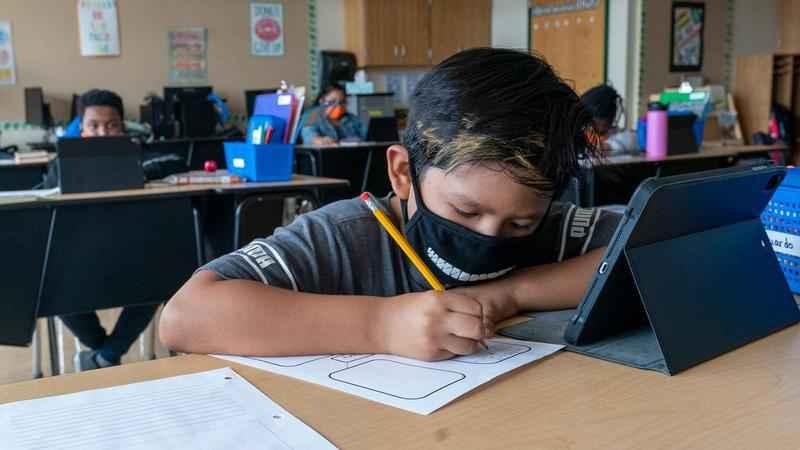KSTP medical expert discusses masking in schools, vaccines for younger children
[anvplayer video=”5048437″ station=”998122″]
As the start of the school year approaches, districts face a dilemma over whether to implement a mask mandate. The delta variant has led to a surge in cases across the country and concerns about children under the age of 12 who are still unable to receive a vaccine.
Minneapolis Public Schools announced Thursday that starting Aug. 9, staff, students and visitors will be required to wear face coverings in all district buildings, regardless of vaccination status.
“It’s a very fluid situation,” said Karen DeVet, the senior operations officer at Minneapolis Public Schools. “Because of the strong recommendations coming out from both the federal government and our state department of health we felt like now was the right time to shift to requiring masks again.”
St. Paul Public School Superintendent Joe Gothard is expected to introduce a mask mandate to the committee of the board next week, with the Board of Education making a final vote at its Aug. 17 meeting.
“Our goal is to keep students and staff safe and physically present in our schools,” said Kevin Burns, a district spokesperson.

In this file photo, a student wears a face mask while doing work at his desk.[AP Photo/Mary Altaffer, File]
The Minnesota Department of Health recently issued recommendations for the 2021-2022 school year, which included masking in school buildings.
“The student doesn’t learn if they’re not comfortable,” said Matt Ripley, who teaches middle schoolers at Sunny Hollow Montessori. “For a lot of my students, the anxiety around COVID and getting sick far outweighs the discomfort of wearing a piece of cloth on their face.”
He said he saw the benefits of masking during the last school year.
"It allowed us to have a year with really nothing stopping their education," Ripley said. “Anything that’s going to allow them to continue through their education and continue having them in those opportunities in-person, I’m all for that."
Susie Shelton-Dodge, who spent 50 years in education working with 3- to 6-year-olds, worries about her young grandchildren.
“I feel like they’re more vulnerable,” she said. “I think asking them to keep a distance, particularly if they’re in pre-school is unrealistic, asking them to wear a mask is realistic.”
On social media, others disagreed with the new recommendations. Opponents who commented on KSTP’s Facebook and Instagram pages voiced concerns about the district taking the decision out of parents’ hands, arguing families should be able to make the decision for themselves.
“The way that the delta variant is circulating and how infectious it is and the fact that children are not eligible to be vaccinated, I think masks in schools are one of the only options that we have,” KSTP Medical Expert Dr. Archelle Georgiou said. “Especially for younger children.”
Currently, children who are younger than 12 are ineligible for a vaccine. Pfizer is working on a vaccine for younger children and is expected to submit data to the U.S. Food and Drug Administration this fall to get emergency use authorization.
“Predictions are that children under the age of 12 will be eligible for vaccination before the end of the year,” Dr. Georgiou said. “We were hoping for earlier in the school year but it’s going to be later, closer to the end of the year.”
It’s been nearly three months since the FDA approved the Pfizer vaccine for children who are 12 to 15 years old. In Minnesota, only about 36% of kids in that age group are fully vaccinated.
“Frankly, I am disappointed it is so low because children are vulnerable to COVID,” Dr. Georgiou said. “Not as vulnerable as older adults but they can still get it and they can still have the side effects even if they ultimately do well. […] What I am even more concerned about is that children are at risk for long COVID symptoms. These are life-altering symptoms, fatigue headaches, not feeling well, muscle aches, shortness of breath, chest pain.”
According to data from the Minnesota Department of Health, there have been 14,958 cases among children who are 0 to 4 years old. There have been 20,400 cases among children 5 to 9 years old, while 29,728 children 10 to 14 years old have contracted COVID.
More than 50,000 COVID cases have been recorded among teenagers 15 to 19 years old in Minnesota.
The Pfizer vaccine requires two doses, 21 days apart. A person becomes fully protected two weeks after the second dose.
“Get [your] kids vaccinated now,” said Dr. Georgiou. “Get them vaccinated because they’re going to be fully immunized just in time for school even if they get their first vaccine this week.”